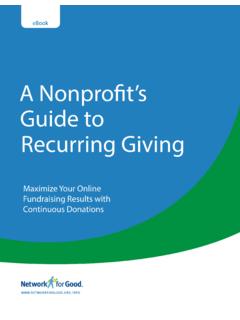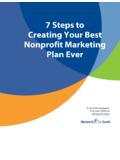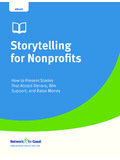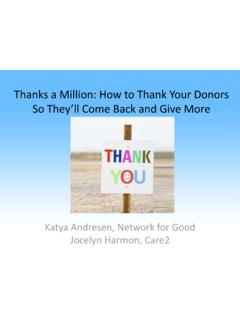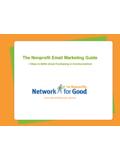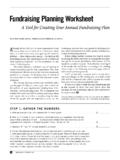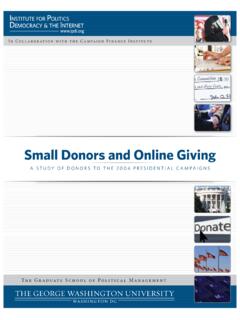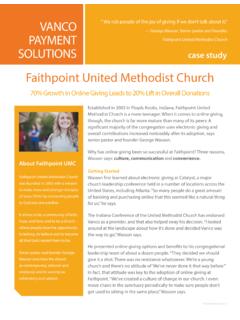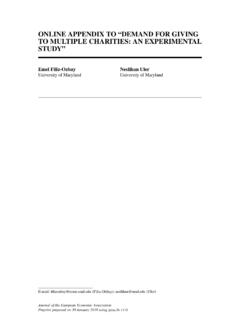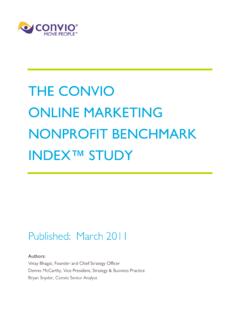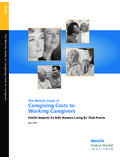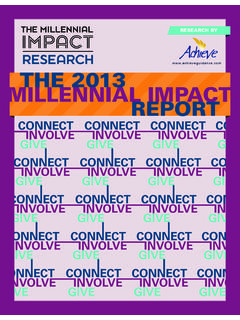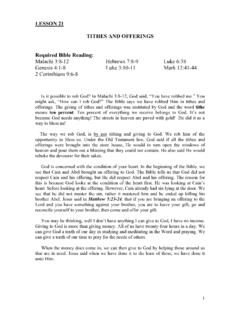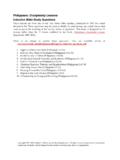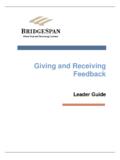Transcription of The Online Giving Study - Online Fundraising, Nonprofit ...
1 A Call to Reinvent Donor RelationshipsThe Online Giving Studyby Network for Good and TrueSense Marketingsponsored by The Study covers $381 million in Online Giving through Network for Good s platform, including million gifts to 66,470 different nonprofits from 2003-2009. The Online Giving experience has a significant impact on donor loyalty, retention, and gift levels. The more intimate and emotionally coherent the Giving experience, the stronger the relationship between donor and Nonprofit appears to be. In other words, Online fundraising is all about relation-ships, as it is in offline fundraising. Personality matters. The loyalty factor for donors acquired through generic Giving pages is lower than for donors who give via charity-branded Giving pages.
2 Analysis of cumulative Online Giving ( , Giving added up over time) via different pages powered by Network for Good shows that donors who gave via charity websites started at the highest level and gave the most over time. Those who used Giving portals started lower and gave less over time. Those who used social Giving opportunities gave the least initially and added little afterward. Recurring Giving is a major driver of Giving over time and should be strongly encouraged in the Giving experience. Online Giving spikes during the month of December and large-scale disasters. During disasters, donors are more likely to consider new Giving options, while in December they are more likely to give based on relationships with the charities.
3 | 1 |Executive SummaryThis isn t another Study about the rapid growth of Online Giving (though it is skyrocketing) it s a call to reinvent donor relationships. This Study of $381 million in Giving looks specifically at the Online Giving experience and finds it is directly tied to donors likelihood of Giving more and more the StudyCONTENTSIt s Still About Relationships .. 3 The Influence of the Online Giving Experience .. 8 December and Disasters Dominate .. 14 Additional Data .. 20 What This Study Examined $381 million in Online Giving million gifts million unique donors 66,470 different nonprofits Seven-year time span (2003-2009) Donations from a wide range of Nonprofit sizes and typesNot so long ago, all fundraising was done face-to-face.
4 Houses of worship passed the plate. Alms were given to the needy where they were. Do-gooders persuaded people they knew to support their Giving happened in the context of personal charities began to learn the techniques and disciplines of mar-keting and advertising to expand their reach to more the new breed of professional fundraisers quickly discovered was that the path to success was getting relational with donors being as much like the old-line, personal methods as s true with major gifts, direct mail, broadcast media, telemarket-ing and as this Study suggests, with Online fundraising, of Online fundraising tend to focus on technology and the latest new bell, whistle or widget.
5 Raising funds Online is not about technology, any more than raising funds through the mail is about paper. It s about the relationship between the Nonprofit and the donor who wants to support a cause. People who give Online are no different from other donors in that they expect a relationship not simply a transaction with the organization they isn t another Study about the rapid growth of Online Giving (though it is skyrocketing). We re not as concerned with the number of Online gifts as with the nature of the Online Giving experience and how it impacts donor looking at donor relationships, not just donor transactions, we ve uncovered something a lot of people already knew: The level of connection to an organization that a donor experiences Online is It s Still About Relationshipsdirectly tied to their likelihood of Giving more and more often.
6 Even small upgrades to the donor experience make a measurable difference in Online some amount of Online Giving will be transactional where donors don t want a relationship with the organization there s no excuse for not improving the Online Giving experience with the donors who do want a relationship. As this Study shows, even a small Nonprofit with limited resources can and should make meaningful connections with their donors Giving Study | ABOUT THE STUDYO nline Giving Growth (2003-2009)Cumulative donations through Network for Good yielded an average annual growth of 56%. The visible stair steps represent the annual December surge in Giving , as well as Hurricane Katrina Giving in 2005.
7 $0M$50M$100M$150M$200M$250M$300M$350M$40 0M$450M2009200820072006200520042003$381M | 3 || 4 |Key Metrics Considered in the Study How many donors were gained and lost How much and how often donors gave Where donors were in the long-term donor lifecycleWhy This Study is DifferentThis Study examines donor behavior over time, using TrueSense Marketing s Donor Health Index, a tool designed to gauge the value and long-term prospects of groups of donors. It looks at key metrics: how many donors were gained and lost, how much and how often donors gave, and where donors were in the long-term donor compares Giving in different Online venues: social networks, Giving portals, and charity websites.
8 This presents a glimpse into what donors are doing as Giving opportunities become increasingly dispersed all over the Internet. We have looked at these results, along with our collective experience with Online outreach, and sought not to simply present data but also to convey some concrete advice for fundraisers and philanthropists who want to get the most out of using the Internet for good causes. This Study should be viewed as a big-picture survey of a portion of Online Giving in several of its most common forms as well as a call to action to improve the experience of Online (and Limitations) of the StudyThe data set for this Study is limited to donations powered by the Network for Good platform.
9 Any Giving that took place on sites that do not use the Network for Good platform or that were made offline are not included. Also, the data do not differentiate what nonprofits are doing to affect donor behavior beyond the Giving transaction. Some do a great job connecting with and engaging donors in many ways and through many channels, while others are doing little. What they do and don t do has a big impact on donor relationships and the metrics we ve for Good processes donations for charities of all sizes, but because we focus our efforts on helping small- to medium-sized nonprofits with their fundraising, there is a strong representation of these nonprofits in our data.
10 There is also a wide range of organizational Benefit*13%International 12%Human Service 30%Health13%Animal & Environment10%Education11%Arts6%Religion 5% Online Giving by Charity Type (2009)Percentage of Online Giving dollars via pages powered by Network for Good by charity type, based on the IRS s National Taxonomy of Exempt Entities (NTEE). *The public benefi t category includes the following types of charities: social action, community involvement/capacity building, some foundations, social science, and technology Giving Study | ABOUT THE Study | 5 |Throughout this Study , we analyze Giving by different Online Giving venues:An example of a charity-branded Giving pageAn example of a generic Giving pageSocial GivingNetwork for Good also powers social networks for social good, where donors can give to many charities and in many cases fundraise among their friends and family.
